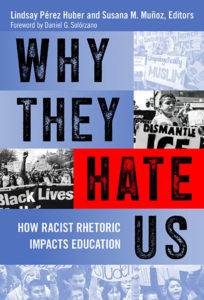Story by media intern Samantha Ye

Words matter, and racist nativist words especially matter when they’re coming from an authority such as the President of the United States.
That is what Lindsay Pérez Huber and Susana M. Muñoz sought to illuminate in their new book, Why They Hate Us: How Racist Rhetoric Impacts Education.
Muñoz, an associate professor of higher education leadership in the School of Education and scholar in the Race and Intersectional Studies in Educational Equity Center at Colorado State University, and Pérez Huber, an associate professor in the College of Education at California State University, are scholars of racial equity in education. In Why They Hate Us, they brought together empirical evidence and theory contextualized within history to document the harm that the Donald Trump administration, through racist nativist rhetoric, has inflicted on students of color.
“Having a book that captures the violence and the harm that this administration has caused communities of color is something that we wanted to document,” said Pérez Huber.
Contents: Examining the Trump Effect
 Muñoz and Pérez Huber edited Why They Hate Us to be grounded in the research of multiple other scholars who have written about these subjects for a long time.
Muñoz and Pérez Huber edited Why They Hate Us to be grounded in the research of multiple other scholars who have written about these subjects for a long time.
It begins with chapters by Pérez Huber and Muñoz looking at how articulations of racist nativism have upheld white supremacy throughout the U.S. historical context. Then, it examines how those ideas have translated into the violent events and harmful discourse of the last half decade.
As Trump began his presidential run in 2015, Pérez Huber said she began thinking about how theory can “help us talk about the ways that Trump is exuding racist nativism and white supremacy, and how people are also following him in very specific ways, like they’re embodying and enacting violence that he is perpetrating.”
The extreme end of the violence can be seen in the events of the Unite the Right rally in Charlottesville and racist motives of the El Paso shooting.
But within classrooms, both K-12 and in higher education, microaggressions and racial violence against students of color were exacerbated by the national discourse.
“Our authors talk about students who are really psychologically and physiologically impacted by racist rhetoric, whether it’s through racial bullying or racial teasing,” said Pérez Huber. “What must it be like for students to show up to their classroom or campus and see border walls being constructed out of cardboard, or to hear chants from children to ‘go back to your country?’ There’s some real harm that is caused in those everyday experiences that students endure in their schools and on their campuses.”
While the book uses the Trump presidency as a case study, the authors are also clear that the problem extends well beyond the former president.
“This did not begin with Donald Trump and it’s not going to end with Donald Trump,” said Muñoz.
Moving beyond words
While rhetoric harms, it takes more than words to enact anti-racist systemic change.
“These are ongoing conversations but also it can’t be just conversations,” said Muñoz.
The outpouring of empty corporate messages last summer during the Black Lives Matter protests shows exactly the kind of performative activism that should be avoided, said Muñoz. As such, Why They Hate Us ends with several recommendations on what it actually takes to be “avowedly anti-racist” in the classroom.
“It’s really about decentering whiteness in very intentional ways,” said Muñoz. “So we look at how we construct curriculum in classrooms, how we teach, the ways in which we teach, how we humanize students, and how we create policies that honor the experiences of those students who have always been at the margins.”
And while the authors believe this book should be in the hands of every educator and policymaker, Muñoz said it is also useful for anyone who wants to be anti-racist as it captures the historical nuance about racist nativism and how entrenched it continues to be in the U.S.
Pérez Huber said she hopes that, in addition to being a reaffirming text for students who have been negatively impacted by the last four years, Why They Hate Us will serve as a tool in helping people think about where to go from here.
“I’m hoping that this book will be helpful for folks who don’t want to go back to where we were before the pandemic,” said Muñoz. “And it’s how to really make radical transformational and liberatory change for the next generation of students and for our students today.”
Why They Hate Us: How Racist Rhetoric Impacts Education is available on Teachers College Press.
The RISE Center is housed in the School of Education, part of CSU’s College of Health and Human Sciences.